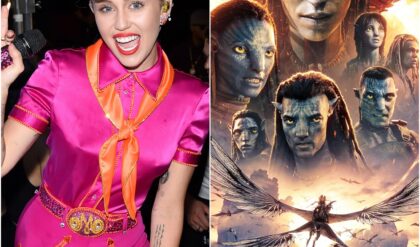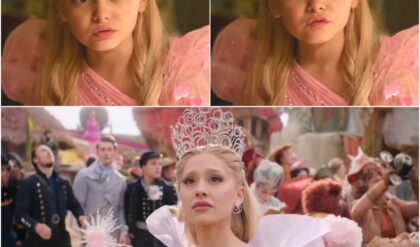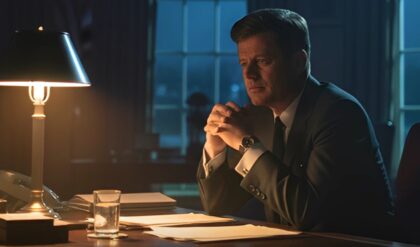When Kali Reis, the Wampanoag and Cape Verdean former boxing champion, stepped into the ring of HBO’s True Detective: Night Country, she faced a formidable opponent—not in the physical sense, but in the towering presence of her co-star, Jodie Foster. In a 2024 interview with Variety at the season’s red carpet premiere, Reis likened working with the two-time Oscar winner to “being at a training camp with Mike Tyson in ’86, in his prime.” This vivid analogy, drawn from her own background as a middleweight boxing champ, captures the intensity, inspiration, and transformative experience of collaborating with Foster on the acclaimed fourth season of the anthology crime drama. Reis, who plays Detective Evangeline Navarro opposite Foster’s Liz Danvers, described Foster as a “legend in the game” whose intelligence, collaboration, and mentorship elevated the set and her own craft.
This article delves into Reis’s reflections on working with Foster, exploring their dynamic in Night Country, the challenges of the production, and the broader impact of the season under showrunner Issa López. It also examines Reis’s unique journey from the boxing ring to the screen, her advocacy for Indigenous representation, and how Foster’s mentorship shaped her performance. At 2,087 words, this piece offers a comprehensive look at their collaboration, the cultural significance of Night Country, and why Reis’s comparison to a Mike Tyson training camp resonates so deeply.
The World of True Detective: Night Country
True Detective: Night Country, which premiered on January 14, 2024, marked a bold reinvention of HBO’s anthology series. Set in the fictional Alaskan town of Ennis during the polar night—a period of unrelenting darkness—the season follows Detectives Liz Danvers (Foster) and Evangeline Navarro (Reis) as they investigate the mysterious disappearance of eight scientists from the Tsalal Arctic Research Station. The case spirals into a chilling blend of crime procedural, supernatural horror, and social commentary, unearthing connections to the murder of an Indigenous activist and themes of environmental exploitation and colonial violence.
Directed and written by Issa López, Night Country distinguished itself with its feminist perspective and focus on Indigenous voices, a departure from the male-centric narratives of earlier seasons. The season became a ratings juggernaut, averaging 12.7 million viewers per episode, making it the most-watched in the series’ history. Critics praised its atmospheric dread, with USA Today’s Kelly Lawler declaring it “so good, it might be better than Season 1.” The ensemble cast, including John Hawkes, Finn Bennett, Fiona Shaw, and Isabella Star LaBlanc, delivered powerful performances, but the chemistry between Foster and Reis anchored the narrative, earning them Emmy nominations for Outstanding Lead Actress and Supporting Actress, respectively.
Filmed in Iceland and Alaska on a $60 million budget, the production faced extreme conditions, from subzero temperatures to long shooting days. The frozen landscapes amplified the story’s sense of isolation, while López’s vision—described as a “Western on ice”—drew inspiration from films like The Thing. The season’s success led to a fifth season renewal, with López returning to helm a new story set in Jamaica Bay, New York.
Kali Reis’s Journey: From Boxing Ring to Hollywood Spotlight
Kali Reis, born in 1986 in Providence, Rhode Island, brings a unique perspective to Night Country. A professional boxer with a record of 19-7-1, including titles in the WBO, WBA, and IBO super lightweight divisions, Reis transitioned to acting with no formal training. Her first role came in 2021’s Catch the Fair One, a thriller about a Native American boxer searching for her missing sister. Director Josef Kubota Wladyka discovered Reis via Instagram, casting her after recognizing her raw intensity. Reis underwent a week-long “acting boot camp” with coach Sheila Gray in New York, which she credits for sparking her passion for performance.
Her performance in Catch the Fair One caught the eye of director Jean-Stéphane Sauvaire, leading to a role in Asphalt City (2023) alongside Sean Penn, where she played a paramedic in a gritty New York drama. When HBO cast her as Evangeline Navarro in Night Country, Reis faced the daunting task of starring opposite Foster in a high-profile series. “I embraced everything about Evangeline, about the role, and about it being so early in my career,” Reis told TODAY.com. “Taking on this massive franchise I’m a fan of, working with Jodie—I’m a huge fan of her work. It was a challenge I welcomed.”
As Navarro, an Iñupiat and Dominican American state trooper, Reis brought authenticity to a character grappling with her cultural identity and personal demons. Navarro’s investigation into the scientists’ disappearance ties to the unresolved murder of Annie Kowtok, a Native activist, reflecting Reis’s own advocacy for Missing and Murdered Indigenous Women (MMIW). Her performance, marked by a tough exterior and vulnerable core, earned praise for its emotional depth, with The Washington Post calling her a “revelation.”
Working with Jodie Foster: A Masterclass in Acting
Reis’s comparison of Foster to Mike Tyson in his 1986 prime—a time when Tyson was an unstoppable force in boxing—reflects the awe and intensity of their collaboration. “She’s so intelligent, so collaborative, supportive,” Reis told Variety. “She had a directorial eye. She had her actor eye, and she was just such a great partner to work with.” Foster, at 60, brought her decades of experience as an actress, director, and producer to the set, serving as both a star and executive producer on Night Country. Her role as Liz Danvers, a cynical and flawed police chief, marked her first major TV role since childhood, a return to the medium that resonated deeply with her work as Clarice Starling in The Silence of the Lambs.
Reis described the experience as akin to a “private acting college,” highlighting Foster’s ability to mentor without overshadowing. “I learn so much, not just about the craft, but how she deals with people in everyday life,” Reis shared with CBR. Foster’s collaborative approach was evident in rehearsals, where she encouraged actors to shape their characters. “It was really fun to participate in the rehearsals,” Foster told Entertainment Weekly. “Hearing John Hawkes talk about his character or Finn Bennett talk about his, we were able to change things based on what other people brought.” Reis noted that Foster pushed for Navarro’s story to be central, ensuring the Indigenous narrative was highlighted. “It made me pinpoint certain things that needed to get highlighted more,” Reis said.
Foster’s mentorship extended beyond technical guidance. Reis, initially intimidated by Foster’s stature, found her approachable and humorous. “I was a fan, and actually meeting her and finding out she was also hilarious and an awesome person was even better,” Reis told Collider. Foster’s advice—“Relax, it’s gonna be fine”—helped Reis navigate the pressure of a major production. Their offscreen bond grew strong, with the two vacationing in Alaska post-filming with Reis’s husband and trainer, Brian Cohen. “I felt truly blessed to have such a great partner,” Foster said, jokingly adding that she’d solve crimes with Reis if she could wear her glasses.
Their onscreen dynamic was equally compelling. Danvers and Navarro, former colleagues with a fraught history, clash over their approaches—Danvers’s rational skepticism versus Navarro’s spiritual intuition. A standout moment comes in episode one, when Navarro, played with steely resolve by Reis, delivers the line: “My spirit animal eats old [expletive] white ladies like you for breakfast.” This quip, one of the most quotable in Indigenous pop culture, underscored Navarro’s defiance and Reis’s ability to hold her own against Foster’s commanding presence. Foster embraced Danvers’s flaws, describing her as “kind of awful” but hiding deep grief, a complexity that complemented Navarro’s arc.
The Challenges of Night Country’s Production
Filming Night Country in Iceland’s stark landscapes and Alaska’s frigid conditions was a test of endurance. “It was cold,” Foster told NPR. “It made us really understand the characters through our bodies in a way we wouldn’t otherwise.” Reis, accustomed to physical challenges as a boxer, found the conditions daunting but enriching. “Inuit and Iñupiaq people are just made different,” she said, marveling at the resilience of Indigenous consultants flown in from Alaska and Greenland. The harsh environment informed their performances, with the icy tundra mirroring the characters’ emotional isolation.
The production’s technical demands were equally intense. A notable prop, the “corpsicle”—a grotesque mass of frozen bodies—required intricate special effects, which Foster praised as “incredible.” Reis recalled working with the prop before meeting the actors it depicted, adding to the surreal experience. Shooting out of order, a common practice in large-scale projects, meant Reis and Foster relied on López’s vision and each other’s trust to maintain narrative coherence. “When I read episode six, I was like, ‘Don’t change a thing,’” Foster said, noting the shocking finale’s impact.
Cultural Impact and Indigenous Representation
Night Country’s focus on Indigenous stories set it apart, with López collaborating with Iñupiat consultants to ensure authenticity. Reis, as a Wampanoag woman, saw her role as a platform for advocacy. “The voice of the film is really Indigenous,” Foster noted. “It’s not my time, it’s their time, and I had my time.” Reis’s character confronts the murder of Annie Kowtok, reflecting the MMIW crisis, and the season’s resolution—where Native women exact justice—resonated powerfully. “Our stories are worth telling,” Reis told ICT News, emphasizing her mission to amplify Indigenous voices.
Reis’s collaboration with Foster amplified this impact. Foster’s support, from advocating for Navarro’s centrality to engaging with cultural consultants, created a set where Indigenous perspectives were prioritized. “Jodie saw what needed to be highlighted,” Reis said, crediting her for strengthening the story’s cultural depth.
Why the Mike Tyson Analogy Resonates
Reis’s comparison to a Mike Tyson training camp encapsulates the intensity of working with Foster—a legend whose presence demands excellence but also inspires growth. Like Tyson in 1986, Foster was at the peak of her craft, bringing a directorial eye from her work on The Beaver and Money Monster, and an actor’s precision honed in films like The Silence of the Lambs. For Reis, a relative newcomer, the experience was a high-stakes challenge that pushed her limits, much like a boxer facing a champion. “I gotta bring the goods,” she told ICT News, reflecting her determination to match Foster’s caliber.
The analogy also highlights Foster’s supportive nature. Just as a trainer like Tyson would push a fighter to improve, Foster mentored Reis with encouragement and humor, fostering a friendship that endured beyond the set. “I left with a friend and such a mentor,” Reis said. Their bond, evident in playful exchanges about future projects like an Odd Couple-style sitcom, underscores the mutual respect that defined their work.
Looking Ahead: Reis and True Detective’s Future
With Night Country’s success, Reis’s star is rising. She’s set to appear in Wind River: Rising, continuing her advocacy through storytelling. Foster, meanwhile, continues with projects like Scarpetta and The Last Bus. As True Detective heads to Season 5, Reis’s experience with Foster has prepared her for bigger roles. “It was a blessing,” she said of the collaboration, a sentiment that echoes her transformative journey from boxer to actress.
In conclusion, Kali Reis’s work with Jodie Foster in True Detective: Night Country was a career-defining moment, akin to a training camp with a legend. Foster’s intelligence, generosity, and talent elevated Reis’s performance, while their partnership brought a powerful Indigenous story to the forefront. As Reis continues to carve her path, her analogy to Mike Tyson captures the awe, challenge, and growth of standing toe-to-toe with a Hollywood icon, ensuring Night Country’s legacy as a milestone for both.





